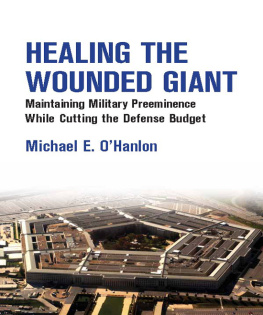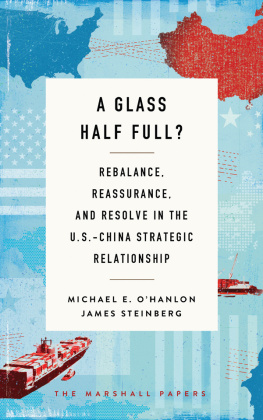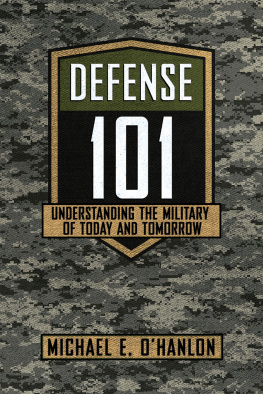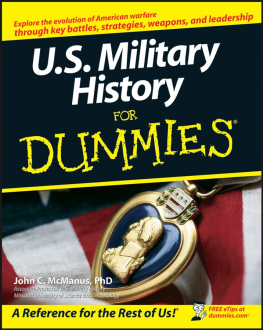Michael OHanlon - Military History for the Modern Strategist: Americas Major Wars Since 1861
Here you can read online Michael OHanlon - Military History for the Modern Strategist: Americas Major Wars Since 1861 full text of the book (entire story) in english for free. Download pdf and epub, get meaning, cover and reviews about this ebook. year: 2023, publisher: Brookings Institution Press, genre: History. Description of the work, (preface) as well as reviews are available. Best literature library LitArk.com created for fans of good reading and offers a wide selection of genres:
Romance novel
Science fiction
Adventure
Detective
Science
History
Home and family
Prose
Art
Politics
Computer
Non-fiction
Religion
Business
Children
Humor
Choose a favorite category and find really read worthwhile books. Enjoy immersion in the world of imagination, feel the emotions of the characters or learn something new for yourself, make an fascinating discovery.

- Book:Military History for the Modern Strategist: Americas Major Wars Since 1861
- Author:
- Publisher:Brookings Institution Press
- Genre:
- Year:2023
- Rating:3 / 5
- Favourites:Add to favourites
- Your mark:
- 60
- 1
- 2
- 3
- 4
- 5
Military History for the Modern Strategist: Americas Major Wars Since 1861: summary, description and annotation
We offer to read an annotation, description, summary or preface (depends on what the author of the book "Military History for the Modern Strategist: Americas Major Wars Since 1861" wrote himself). If you haven't found the necessary information about the book — write in the comments, we will try to find it.
Michael OHanlon: author's other books
Who wrote Military History for the Modern Strategist: Americas Major Wars Since 1861? Find out the surname, the name of the author of the book and a list of all author's works by series.
Military History for the Modern Strategist: Americas Major Wars Since 1861 — read online for free the complete book (whole text) full work
Below is the text of the book, divided by pages. System saving the place of the last page read, allows you to conveniently read the book "Military History for the Modern Strategist: Americas Major Wars Since 1861" online for free, without having to search again every time where you left off. Put a bookmark, and you can go to the page where you finished reading at any time.
Font size:
Interval:
Bookmark:

MILITARY HISTORY FOR THE MODERN STRATEGIST
AMERICAS MAJOR WARS SINCE 1861
MICHAEL OHANLON
BROOKINGS INSTITUTION PRESS
Washington, D.C.
Published by Brookings Institution Press
1775 Massachusetts Avenue, NW
Washington, DC 20036
www.brookings.edu/bipress
Co-published by Rowman & Littlefield
An imprint of The Rowman & Littlefield Publishing Group, Inc.
4501 Forbes Boulevard, Suite 200, Lanham, Maryland 20706
www.rowman.com
86-90 Paul Street, London EC2A 4NE
Copyright 2023 by Michael OHanlon
All rights reserved. No part of this book may be reproduced in any form or by any electronic or mechanical means, including information storage and retrieval systems, without written permission from the publisher, except by a reviewer who may quote passages in a review.
The Brookings Institution is a nonprofit organization devoted to research, education, and publication on important issues of domestic and foreign policy. Its principal purpose is to bring the highest quality independent research and analysis to bear on current and emerging policy problems.
Composition by Westchester Publishing Services
Typeset in Sabon
British Library Cataloguing in Publication Information Available
Library of Congress Cataloging-in-Publication Data Is Available
ISBN 978-0-8157-3983-8 (cloth)
ISBN 978-0-8157-3984-5 (ebook)
 The paper used in this publication meets the minimum requirements of American National Standard for Information SciencesPermanence of Paper for Printed Library Materials, ANSI/NISO Z39.48-1992
The paper used in this publication meets the minimum requirements of American National Standard for Information SciencesPermanence of Paper for Printed Library Materials, ANSI/NISO Z39.48-1992
This is a book about the big questions of modern American military history: why did wars happen, what were their main phases, how were they fought and won or lostand could their outcomes have plausibly been different? It also seeks lessons to inform anyone in the United States or elsewhere who is fascinated by questions of strategy, whether at grand levels of national purpose or at more specific military levels.
The wars considered here have generated huge literatures already. Throughout this project, and throughout my life, I have been an admirer and consumer of history. I would like to express my gratitude to those professionals who make it their lives workas well as my preemptive acknowledgment for undoubtedly missing important dimensions of some of the literature. Moreover, historians through their rigorous research and their analytical excellence continue to improve our understanding of past wars. To take just the example of World War II: in relatively recent years we have learned that blitzkrieg was less tank-centric than often previously understood, that strategic bombing was less effective than expected in weakening the industrial output of Americas adversaries, and that aircraft carriers were less dominant overall in the naval warfare of that era than often believed. In writing this book, I was the beneficiary of these and many other profound and important insights produced by the history discipline.
All that said, my goal here is specific and, I hope, complementary to most previous works: to explain the wars key causes, major campaigns, dynamics, and outcomes conceptually and succinctly. Military history is often extremely detailed. That makes sense. It is the courage, sacrifice, and drama of individuals and peoples trying to achieve victory and avoid defeat and death that inspires and fascinates us at the human level. But the general reader or busy policymaker may also want a more conceptual, and concise, treatment of modern U.S. historys major wars. This book attempts to provide that resource. It begins with the conflict that for the United States marked the beginning of industrialized and large-scale combat, the U.S. Civil War. It examines each world war, then Korea and Vietnam, and concludes with Iraq and Afghanistan.
The narrative here emphasizes what is often termed the operational or campaign level of war. It seeks to link military operations, wartime objectives, and grand strategy. I hope that approach makes it a useful contribution to the literature, together with the fact that it brings the reader into the year 2022, and thus is more contemporary than some earlier surveys of conflicts over the ages. In these ways, it indeed presents military history for the modern strategist.
Individual battles are certainly discussed, too. But the priority is to explain how they fit into a sequence of battles and other events typically lasting multiple months over a given geographic region. Think, for example, of General George McClellans peninsula campaign that began with a major troop movement by boat down the Chesapeake Bay, designed to seize Richmond during the spring and early summer of 1862 in the U.S. Civil War. Or consider General Robert E. Lees efforts from late summer 1862 through mid-1863 to take the fight to the North at Antietam and Gettysburg, or General Ulysses S. Grants laborious but ultimately successful year-long effort to mount a campaign against Lees armies in Virginia starting in the spring of 1864. Germanys attacks on northern France in the world wars are other salient examples, as are the American island-hopping campaigns during the approaches to Japan in World War II, or General Douglas MacArthurs Inchon landings followed by his fraught decision to move northward toward the Yalu River in the Korean War.
The main purpose of this book is to chronicle, analyze, and reflect upon modern American military history. In that sense, it is a primer. But it is also a primer with a purpose. The central lessons of the book center on the persistent and dangerous proclivity of decisionmakers to display naivete, as well as overconfidence, about the likely courses, costs, and outcomes of war. Vladimir Putin has delivered the world a signature example of this flawed human tendency with his ill-fated aggression against Ukraine. That war began on February 24, 2022; Putin probably expected it would end within days, and certainly by V-E Day in Russia on May 9. As of this writing in the summer of 2022, sadly, the conflict continues. Russias early hopes for a knockout blow against the government, and perhaps even an annexation of much or most of the country, have joined the litany of countless other cases in history in which aggressors began wars with breathless enthusiasm and unwarranted optimism for quick, easy wins.
The danger of overconfidence may increase when policymakers have not recently experienced a cataclysmic event in their own lifetimes or careers. It also grows when the advent of new technologies creates exciting new possibilities for military plannersyet often with accompanying downsides or vulnerabilities that are underappreciated at the time decisionmakers choose to go to war. It also seems most likely when decisionmakers misunderstand or underestimate their potential adversariesand the human tendency to become more committed to a war, rather than less, once family and friends begin to die at the hands of an enemy. Indeed, to continue with the contemporary Russian example, prior to launching his brazen invasion of Ukraine, Putin had become accustomed to relatively easy wins in places such as Crimea and Syria in recent years, had taken great pride in his military modernization effort of the previous decade that had produced highly-touted new missiles among other weaponry, and had developed a contempt for President Volodymyr Zelensky of Ukraineas well as the very concept of Ukraine as a truly independent and sovereign nation.
Font size:
Interval:
Bookmark:
Similar books «Military History for the Modern Strategist: Americas Major Wars Since 1861»
Look at similar books to Military History for the Modern Strategist: Americas Major Wars Since 1861. We have selected literature similar in name and meaning in the hope of providing readers with more options to find new, interesting, not yet read works.
Discussion, reviews of the book Military History for the Modern Strategist: Americas Major Wars Since 1861 and just readers' own opinions. Leave your comments, write what you think about the work, its meaning or the main characters. Specify what exactly you liked and what you didn't like, and why you think so.






